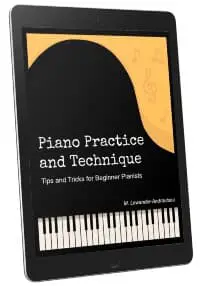- Home
- Piano Practice
- Back to Practice Piano Advice: How Fast to Play and Practice Plan
Back to Practice Piano Advice: How Fast to Play and Practice Plan
Hello and thank you for offering services to answer questions!
I have been on and off my piano practicing and am trying to stick with a system to practice well.
I wanted to ask 3 questions. First, how fast do we need to be when practicing scales? Second, would this practice plan of mine be well enough to better my skills?:
- 10-15 min warm up with scales
- 30 min practice with chords and songs (done from a music app).
Third, When is the best time to learn how to play by ear?
Thank you, any advice and recommendations will be greatly appreciated.
Maria's Answer:
Hello there!
Great questions!
About your first question: Anything you want to be able to play very fast has to be learned very slow at first. Once you have learned the correct finger-hand-body movements playing a scale extremely slow, it's actually rather easy to increase speed.
But, if you begin to fast, or practice in a "sloppy" manner, you may never get the scales up to speed. So, slow is key.
For your second question, I think it's important to ponder that we may create the most ideal and fantastic practice plan, but the only thing that works to improve a skill is to keep doing it consistently. Make it a habit.
Any system of practicing a skill will make you better if:
1. You make it a habit.
2. You enjoy doing it.
So, first of all, you need to set aside a time for practicing that works for you, so that you'll make it into a habit.
Daily is best, but as long as it's regular you will see results. Also make sure that the time you spend is enjoyable so that you absorb every second of it.
Practice with your brain, but without a "heart", progress will be tedious.
So, back to your question; yes, it's a good idea, to begin with, warm up's of any kind. You can set the time as you like, it's not important exactly how much. It may also change depending on what skills you want to "hone" in on that day.
Then it's a great idea to work on repertoire, new and old. I prefer to begin with a new repertoire. This is divided into manageable chunks, studied, and practiced from small parts to whole.
The old repertoire is pieces that you already have learned. They will need maintenance and polishing to be remembered. This is nice to end the practice session with, as you can focus on playing and creating.
To your third and final question, I'd like to say "Immediately"! Start playing by ear as soon as possible.
Not only will this improve your aural skills, but it will deepen your understanding of how music is made, and free you to become more acquainted with your instrument and interact with it.
Happy Practicing!
